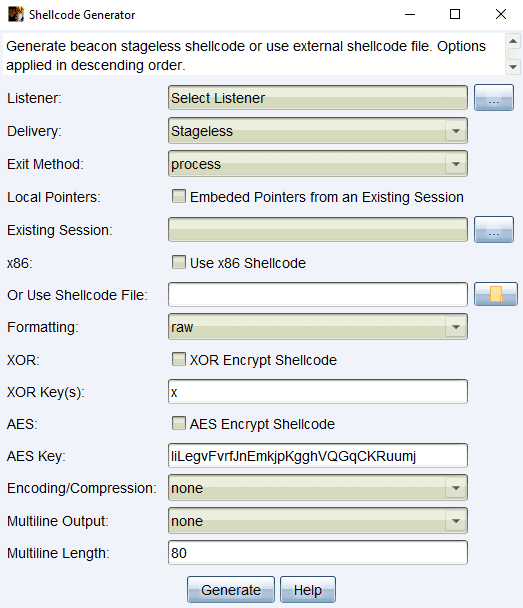CSSG: Cobalt Strike Shellcode Generator

Cobalt Strike Shellcode Generator
Adds Shellcode – Shellcode Generator to the Cobalt Strike top menu bar
CSSG is an aggressor and python script used to more easily generate and format beacon shellcode
Generates beacon stageless shellcode with exposed exit method, additional formatting, encryption, encoding, compression, multiline output, etc
shellcode transforms are generally performed in descending menu order
Options for the shellcode generator are:
Listener:
Select a valid listener with the “…” button. Shellcode will be generated form this listener selection
Delivery:
Stageless (Staged not supported for the shellcode generator)
Exit Method:
process – exits the entire process that beacon is present in when the beacon is closed
thread – exits only the thread in which beacon is running when the beacon is closed
Local Shellcode Checkbox:
May use if you are going to execute the shellcode from an existing Beacon
Generates a Beacon shellcode payload that inherits key function pointers from a same-arch parent Beacon
Existing Session:
The parent Beacon session where the shellcode will pull session metadata
Shellcode should be run from within this Beacon session
x86 Checkbox:
Check to generate x86 shellcode, x64 is generated by default
Or Use Shellcode File:
Use an externally generated raw shellcode file in lieu of generating Beacon shellcode
This allows you to use previously exported shellcode files or output from other tools (Donut, msfvenom, etc)
Formatting:
raw – raw binary shellcode output, no formatting applied
hex – hex formatted shellcode output
0x90,0x90,0x90 – shellcode formatted into a C# style byte array
\x90\x90\x90 – shellcode formatted into a C\C++ style byte array
b64 – option to base64 encode the shellcode early in the generation process (before any encryption)
XOR Encrypt Shellcode Checkbox:
Check to XOR encrypt the shellcode (only one encryption type can be selected at a time)
XOR Key(s):
Randomly generated and editable XOR key character(s) to use for encryption
Multiple characters will result in multiple rounds of XOR encryption (i.e. ABCD)
AES Encrypt Shellcode Checkbox:
Check to AES encrypt the shellcode (only one encryption type can be selected at a time)
Uses a python script to perform AES Block Cipher AES-CBC encryption
Shellcode is padded with \0 values to reach block size requirements
A randomly generated IV is prepended to the encrypted shellcode data
AES Key:
Randomly generated and editable AES key to use for encryption
32byte key is generated and preferred for 256bit encryption strength
Encryption key byte lengths accepted are 16, 24, and 32
Encoding/Compression:
none – No additional encoding or compression is done to the shellcode
b64 – base64 encode the shellcode
gzip then b64 – gzip compress then base64 the shellcode
gzip – gzip compress the shellcode
b64 then gzip – base64 then gzip compress the shellcode
Multiline Output:
Can be used for non-raw/binary output formats
none – no multiline formatting, shellcode is one long string
quoted – Shellcode is broken up into lines surround by quotation marks
chunks.push_back – Shellcode is broken up into lines surrounded by chunks.push_back(” and “);
Multiline Length:
Number of shellcode characters in each line if a multiline output option is selected
Generate Button:
Select directory for shellcode output
Defalut filename will be beacon but can be changed
Any encryption key used will be displayed in a popup and also written the Cobalt Strike Script Console
The byte size of the raw beacon shellcode and final formatted beacon shellcode will be displayed in a popup and also written to the Script Console
Location of files used to generate/build the shellcode are set the .cs file
Install
Requirements:
The optional AES encryption option uses a python script in the /assets folder
Depends on the pycryptodome package to be installed to perform the AES encryption
Install pycryptodome with pip depending on your python environment:
python -m pip install pycryptodome python3 -m pip install pycryptodome py -3 -m pip install pycryptodome py -2 -m pip install pycryptodome
You can check that pycryptodome is present after the pip install with a command like:
python -m pip list | grep crypto
The generator will use the system’s default “python” command to launch the AES encryption script
Download
git clone https://github.com/RCStep/CSSG.git
Source: https://github.com/RCStep/





